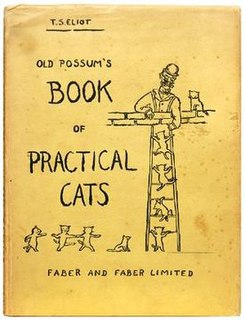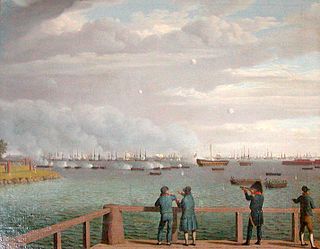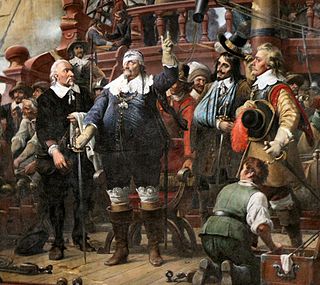Related Research Articles

Lübeck, officially the Hanseatic City of Lübeck, is a city in Northern Germany. With around 217,000 inhabitants, Lübeck is the second-largest city on the German Baltic coast and in the state of Schleswig-Holstein, after its capital of Kiel, and is the 35th-largest city in Germany. The city lies in Holstein, northeast of Hamburg, on the mouth of the River Trave, which flows into the Bay of Lübeck in the borough of Travemünde, and on the Trave's tributary Wakenitz. The city is part of the Hamburg Metropolitan Region, and is the southwesternmost city on the Baltic, as well as the closest point of access to the Baltic from Hamburg. The port of Lübeck is the second-largest German Baltic port after the port of Rostock. The city lies in the Northern Low Saxon dialect area of Low German.

The Great Northern War (1700–1721) was a conflict in which a coalition led by the Tsardom of Russia successfully contested the supremacy of the Swedish Empire in Northern, Central and Eastern Europe. The initial leaders of the anti-Swedish alliance were Peter I of Russia, Frederick IV of Denmark–Norway and Augustus II the Strong of Saxony–Poland–Lithuania. Frederick IV and Augustus II were defeated by Sweden, under Charles XII, and forced out of the alliance in 1700 and 1706 respectively, but rejoined it in 1709 after the defeat of Charles XII at the Battle of Poltava. George I of Great Britain and the Electorate of Hanover joined the coalition in 1714 for Hanover and in 1717 for Britain, and Frederick William I of Brandenburg-Prussia joined it in 1715.

Old Possum's Book of Practical Cats (1939) is a collection of whimsical light poems by T. S. Eliot about feline psychology and sociology, published by Faber and Faber. It serves as the basis for Andrew Lloyd Webber's 1981 musical Cats.
A symphonic poem or tone poem is a piece of orchestral music, usually in a single continuous movement, which illustrates or evokes the content of a poem, short story, novel, painting, landscape, or other (non-musical) source. The German term Tondichtung appears to have been first used by the composer Carl Loewe in 1828. The Hungarian composer Franz Liszt first applied the term Symphonische Dichtung to his 13 works in this vein.

The Battle of Copenhagen of 1801, also known as the First Battle of Copenhagen to distinguish it from the Second Battle of Copenhagen in 1807, was a naval battle in which a British fleet fought and defeated a smaller force of the Dano-Norwegian Navy anchored near Copenhagen on 2 April 1801. The battle came about over British fears that the powerful Danish fleet would ally with France, and a breakdown in diplomatic communications on both sides. The Royal Navy won a resounding victory, besting fifteen Danish warships while losing none in return.
Nordic folk music includes a number of traditions in Northern European, especially Scandinavian, countries. The Nordic countries are Iceland, Norway, Sweden, Denmark and Finland.

Meera, better known as Mirabai and venerated as Sant Meerabai, was a 16th-century Hindu mystic poet and devotee of Krishna. She is a celebrated Bhakti saint, particularly in the North Indian Hindu tradition.

The Second Battle of Copenhagen was a British bombardment of the Danish capital, Copenhagen, in order to capture or destroy the Dano-Norwegian fleet during the Napoleonic Wars. The incident led to the outbreak of the Anglo-Russian War of 1807, which ended with the Treaty of Örebro in 1812.
Brian Easdale was a British composer of operatic, orchestral, choral and film music.

Terje Vigen is a poem written by Henrik Ibsen, published in 1862. Much of the story and setting is from the area around the town of Grimstad in southern Norway where Ibsen lived for a few years in his youth. It describes the dramatic saga of Terje who, in 1809, tried to run the British blockade of Norway's southern coast in a small rowboat in a desperate attempt to smuggle food from Denmark back to his starving wife and daughter. He was captured and imprisoned on a British prison hulk and released in 1814 after the Napoleonic Wars were over, only to find that his family had died. He became a pilot, and years later rescued an English lord who turned out to be the commander of the ship that had captured him. The denouement, as in most Ibsen works, should be understood by reading the original.
Battle of the Baltic may refer to:

Denmark–Russia relations involve the relationship between the two countries of Denmark and Russia. The Kings of Denmark and the Russian Tsars interacted from the 15th century onwards - subsequently Denmark's control of access to and from the Baltic Sea had considerable significance for the trade and naval flexibility of the Russian Empire, while rivalries between Denmark and Sweden on the one hand and between Sweden and Russia on the other led to alliances and military support. Denmark and the USSR established diplomatic relations on 18 June 1924.

Kong Christian stod ved højen mast, commonly shortened to Kong Christian, is the royal anthem of the Kingdom of Denmark. It also has equal status of national anthem together with Der er et yndigt land, though it is almost exclusively used in relation to the Danish royal house and the military. The theme of the song is about the heroics of Danish sailors during the wars against Sweden in the 17th and 18th centuries.
The Stratton String Quartet was a well-known British musical ensemble active during the 1930s and 1940s. They were specially associated with the performance of British music, of which they gave numerous premieres, and were a prominent feature in the wartime calendar of concerts at the National Gallery. After the War the group was re-founded as the Aeolian Quartet.
Events from the year 1807 in Denmark.

Mary Louisa Armitt was an English polymath. She was a teacher, writer, ornithologist and philanthropist. She was the funder and founder of the Armitt Library, Ambleside.

The British Baltic Fleet and also known as the Baltic Squadron was a series of temporary or semi permanent fleets of the Royal Navy. They were assembled for various naval operations in the Baltic Sea from 1658 to 1856 commanded by the Commander-in-Chief, Baltic Fleet.

Hilda Wilson was a British contralto and composer who also used the name Matilda Ellen Wilson and composed under the name Douglas Hope.
Harriet Wainwright Stewart was a British composer, singer, and writer. A musical entrepreneur, she developed a subscription list of several hundred people and sold at least two of her compositions to subscribers.
Alexandra Thomson Studholme was a British composer who published her music under the name Alexandra Thomson.
References
- ↑ Brown, James Duff; Stratton, Stephen Samuel (1897). British Musical Biography: A Dictionary of Musical Artists, Authors, and Composers Born in Britain and Its Colonies. S.S. Stratton.